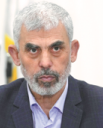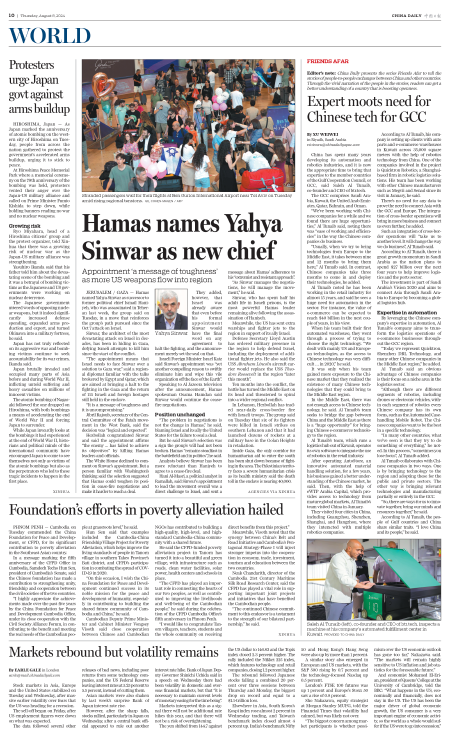
Yahya Sinwar

Stranded passengers wait for their flights at Ben Gurion International Airport near Tel Aviv on Tuesday amid rising regional tensions.
JERUSALEM/GAZA — Hamas named Yahya Sinwar as successor to former political chief Ismail Haniyeh, who was assassinated in Teheran last week, the group said on Tuesday, in a move that reinforces the group's path pursued since the Oct 7 attack on Israel.
Sinwar, the architect of the most devastating attack on Israel in decades, has been in hiding in Gaza, defying Israeli attempts to kill him since the start of the conflict.
"The appointment means that Israel needs to face Sinwar over a solution to Gaza war," said a regional diplomat familiar with the talks brokered by Egypt and Qatar, which are aimed at bringing a halt to the fighting in the Gaza and the return of 115 Israeli and foreign hostages still held in the enclave.
"It is a message of toughness and it is uncompromising."
Jibril Rajoub, secretary of the Central Committee of the Fatah movement in the West Bank, said the decision was "logical and expected".
Hezbollah congratulated Sinwar and said the appointment affirms "the enemy ... has failed to achieve its objectives" by killing Hamas leaders and officials.
The White House declined to comment on Sinwar's appointment. But a person familiar with Washington's thinking said the selection suggested that Hamas could toughen its position in cease-fire negotiations and make it harder to reach a deal.
They added, however, that Israel was already aware that even before his formal appointment Sinwar would have the final word on any agreement to halt the fighting, and the announcement merely set the seal on that.
Israeli Foreign Minister Israel Katz said Sinwar's appointment was "yet another compelling reason to swiftly eliminate him and wipe this vile organization off the face of the Earth".
Speaking to Al Jazeera television after the announcement, Hamas spokesman Osama Hamdan said Sinwar would continue the ceasefire negotiations.
Position unchanged
"The problem in negotiations is not the change in Hamas," he said, blaming Israel and its ally the United States for the failure to seal a deal.
But he said Sinwar's selection was a sign the group's will had not been broken. Hamas "remains steadfast in the battlefield and in politics", he said.
Analysts believe Sinwar has been more reluctant than Haniyeh to agree to a cease-fire deal.
Hani Al-Masri, a political analyst in Ramallah, said Sinwar's appointment to lead the movement overall was a direct challenge to Israel, and sent a message about Hamas' adherence to his "extremist and resistant approach".
"As Sinwar manages the negotiations, he will manage the movement," he said.
Sinwar, who has spent half his adult life in Israeli prisons, is the most powerful Hamas leader remaining alive following the assassination of Haniyeh.
Meanwhile, the US has sent extra warships and fighter jets to the region in support of its ally Israel.
Defense Secretary Lloyd Austin has ordered military presence in the region to help defend Israel, including the deployment of additional fighter jets. He also said the USS Abraham Lincoln aircraft carrier would replace the USS Theodore Roosevelt in the region "later this month".
Ten months into the conflict, the battle has turned the Middle East on its head and threatened to spiral into a wider regional conflict.
In Lebanon, Hezbollah has traded near-daily cross-border fire with Israeli troops. The group said on Tuesday that six of its fighters were killed in Israeli strikes on southern Lebanon and that it had launched dozens of rockets at a military base in the Golan Heights in retaliation.
Inside Gaza, the only corridor for humanitarian aid to enter the south has been shut down because of fighting in the area. The Palestinian territory faces a severe humanitarian crisis as its health ministry said the death toll in the enclave is nearing 40,000.

